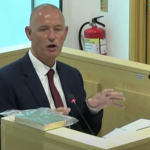Boris Johnson is looking at raising National Insurance in order to fund long-promised reforms of social care.
According to The Times, National Insurance payments for businesses and employees will rise by 1 percentage point, a penny in the pound.
The move will generate an extra £10bn annually, its report added.
Please use Chrome browser for a more accessible video player
Any tax rise would prove controversial however, as the Conservatives committed in their 2019 general election manifesto not to raise income tax, VAT or National Insurance.
The Sun reported that the prime minister and Chancellor Rishi Sunak are “close” to agreeing the National Insurance rise.
Speaking at a regular Westminster briefing for journalists, the PM’s spokesman did not deny the reports.
“There’s continued speculation but I’m simply not going to be engaged with that speculation,” he said.
“The process for agreeing our proposals is still ongoing. We will set that out before the end of the year.”
Speaking on Monday, the PM said it “won’t be too long now” before he lays out his plans for changing the system.
Mr Johnson promised to “fix the crisis in social care once and for all with a clear plan we have prepared” when he addressed the nation outside Downing Street after becoming PM in 2019.
Please use Chrome browser for a more accessible video player
He said the issue of what to do with social care had “bedevilled governments for at least three decades”.
“All I can say is we’ve waited three decades, you’re just going to have to wait a little bit longer,” he said.
“I’m sorry about that but it won’t be too long now, I assure you.”
Speaking to Sky News earlier, business minister Paul Scully said he did not recognise reports about a rise in National Insurance to fund social care.
“Well, I’ve read about the speculation this morning, that’s not something I recognise, so, you know, we’ll see what happens in terms of when we announce our details on social care,” he told Kay Burley.
Mr Scully added: “What we do want to happen is to make sure that we can come up with a comprehensive programme to tackle social care.
“It’s been around for a long time this issue, and we really do need to get to grips with it, and that’s what the prime minister and the health secretary are really determined to do.”
Please use Chrome browser for a more accessible video player
Labour’s shadow economic secretary Pat McFadden said paying for social care must be fair to all income groups and all ages.
“There’s been a social care problem in the country for many, many years. We know we’ve got to fix it, the COVID pandemic has shown us the problems in the system, and we understand that’s got to be paid for,” he said.
“And again, with a tax proposal, which has been briefed to one or two newspapers, the best way to judge it is on two criteria.
“One: does it really fix the problem in social care? And secondly, is it fair to people of all ages, and all income groups?”
Professor Len Shackleton, editorial and research fellow at the Institute of Economic Affairs think tank, said raising National Insurance would be “yet another burden on working age people at a time when jobs are insecure, inflation is rising and wages are squeezed”.
He said: “Much of the public may believe that National Insurance pays for the NHS, and social care would just be a natural addition. But NI is not ringfenced and is simply an income tax by another name, albeit with different exemptions, starting points and arbitrary changes in rates which don’t coincide with tax bands.
“It is wrong to place the burden of this tax squarely on the shoulders of younger workers, without extending NI to post-state pension age taxpayers to help pay.”






















